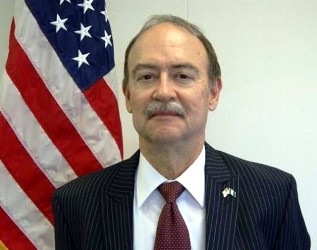US diplomat renews calls to resume dialogue over bilateral relations with Sudan
August 14, 2012 (KHARTOUM) — US Chargé d’affaires, Joseph D. Stafford, has renewed his country’s desire to overcome the challenges facing bilateral relations between the two countries through dialogue, the official news agency reported today.
 Stafford who has been very active since his arrival in the Sudanese capital met Tuesday with the presidential assistant Nafie Ali Nafie in his office at the presidential palace to discuss ways to improve the bad relations between the two countries.
Stafford who has been very active since his arrival in the Sudanese capital met Tuesday with the presidential assistant Nafie Ali Nafie in his office at the presidential palace to discuss ways to improve the bad relations between the two countries.
“I took this opportunity to assure him of the US government desire, through the rapid dialogue, to overcome the challenges facing bilateral relations,” the American diplomat told reporters in Khartoum following the meeting.
The Chargé d’affaires however declined to elaborate on the issues he discussed with Nafie who often is strongly critical of US policy towards Sudan and refuses any role for Washington in the resolution of Sudan’s crisis.
After adding Sudan to the state terror list in 1993, the Clinton administration imposed economic sanctions on Sudan in 1997, citing the Khartoum government’s support for terrorism and human rights violations.
On 1 August, President Obama’s special envoy to Sudan, Princeton Lyman, called to resume talks on the normalisation of bilateral relations pointing out that it is not in the US’s “interest to have poor relations with Sudan.”
The US failure to lift sanctions as promised before the signing of the 2005 Comprehensive Peace Agreement (CPA) led to the deterioration of relations and prevented Washington from supporting the implementation of the peace deal. It also contributed to boost an anti-CPA group within the ruling National Congress Party which hampered its completion.
Pro-South Sudan groups in Washington also thought that a hostile environment and pressure on Khartoum would help ensure the independence of southern Sudan after the end of the interim period in 2011.
However gradually the American administration has realised that is has no leverage to promote peace, democracy and human rights in Sudan. This has been illustrated in their failed efforts done to support the resolution of Darfur crisis and the recent crisis of Blue Nile and South Kordofan.
During the Doha process, while the signing of a peace agreement between the Liberation and Justice Movement (LJM) was in its final stages Lyman and Dane Smith, his adviser on Darfur, proposed to keep talks with the Justice and Equality Movement (JEM). However, this gave the opportunity to Sudanese officials in two meetings held in May 2011 in Doha to reject any American proposition even if they were positive.
Washington has also failed to resolve the humanitarian crisis in South Kordofan despite harsh language against Khartoum. It was also unable to implement its threats to deliver direct humanitarian aid through South Sudan to the affected areas because such move would be seen as direct support to the rebels.
During his speech at the Atlantic Council in Washington Lyman said there is a need to move with Khartoum in order to improve relations starting by the lift of sanctions as it was pledged for the second time before the referendum on South Sudan’s independence.
He admitted that Khartoum is not alone accountable of the delay in the resolution of the Sudan and South Sudan’s outstanding issues. But he pointed out that Khartoum has to stop bombing against civilians in the Two Areas, allow humanitarian access and to resume talks with the SPLM-North rebels.
Lyman in his speech insinuated that the US administration, instead of constant and unproductive pressure, can move forward to improve bilateral relations through a process of confidence building and supporting the regime to achieve justice and development in Darfur and ending South Kordofan and Blue Nile war.
He was also critical to calls for regime change stressing that “Sudan has lived with war much of its history”, pointing out that Sudanese rebels call for regime change means the continuation of conflicts there.
(ST)
